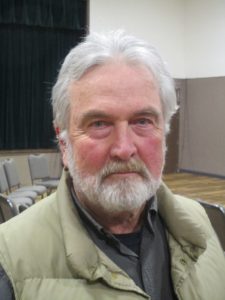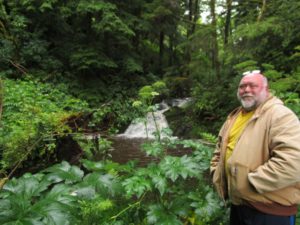
By DANA TIMS/YachatsNews.com
As a kid growing up in the cornfields of south-central Ohio, Sam Hillman heard the stories and saw the pictures of mile after mile of Pacific Northwest forests and ocean.
Someday, he promised himself, he’d make the trek west to see them for himself.
Now that dream is coming true as the 22-year-old embarks on an 11-month stint in Yachats, where he will put his own science background to work helping map and plan the future of the city’s sometimes-overwhelmed water supply.
“I can’t imagine a better way to spend a year in Oregon,” Hillman said in an interview. “Definitely the chance of a lifetime.”
He is one of 21 new members of the Resource Assistance for Rural Environments (RARE) program now being deployed to small towns across the state.
RARE, an AmeriCorps program administered by the University of Oregon, aims to increase the capacity of rural communities to improve their economic, social and environmental conditions. In doing that, it places trained, graduate-level members in areas needing assistance in a variety of areas.
Other current placements include the cities of La Grande, Veneta and Sisters, as well as with the Wasco County Extension Service and the Roseburg Public Library, among others.
“We draw talented young people from all over the United States and put them to work in all areas of rural Oregon,” said Titus Tomlinson, the program’s director, who served two different stints as a program member. “In Sam and the city of Yachats, we found as perfect a match as you possibly could have imagined.”
Hillman, working as a coastal conservation associate, will spend at least 40 hours a week on a work plan that is still being refined. What’s certain, however, is that the bulk of his time will be spent helping the city complete ambitious, long-term plans for identifying future sources of drinking water – a commodity that is in short enough supply that the city has had to impose water restrictions two of the past three years.
“We are very excited about the skills that Sam brings to the table,” said Rick McClung, Yachats’ water and streets supervisor. “He’s coming here to better himself and do great things for the community.”
Yachats group spurred intern idea
Hillman’s placement took roots months ago, when members of View the Future, a decades-old Yachats conservation nonprofit, began talking with the McKenzie River Trust, a Eugene-based organization dedicated to preserving water quality.
After learning more about the university’s RARE program, the two groups approached the city of Yachats to see if all three were interested in sponsoring a RARE intern for a year-long stay to help with water planning.

“We all knew we could use the extra assistance,” said John Purcell, View the Future’s co-chair. “And we’re all thrilled at how this is all working out.”
Purcell and others say they were impressed by Hillman’s work at Ithaca College in New York, where he graduated with a degree in environmental studies and minors in both politics and philosophy.
While at Ithaca, Hillman managed the college’s 560-acre nature preserve. He directed the operations of up to 14 staff members and conducted water-quality assessments at six different sites around the preserve.
“That should serve as a good spring board to the kind of work that needs to be done in Yachats,” Purcell said. “He’s a great fit.”
Hillman will split his time, working Monday through Wednesday for the McKenzie River Trust, and Thursday and Friday for the city.
Daniel Dietz, the Trust’s conservation director, said the timing of Hillman’s work couldn’t be more opportune.
“We have been expanding our reach outside the McKenzie River watershed since about 2010,” he said. “But there has been something of a vacuum in water-quality planning on the central coast. This is really about determining if the Yachats area could use more capacity and, if so, how do we go about planning that?”
City looks at ‘water security’

The city currently gets its drinking water from Salmon and Reedy creeks. However, it does not own lands in those respective drainages. Warning lights indicating that additional sources might be needed flashed about five years ago, when commercial logging on Salmon Creek led to increased acidity and turbidity levels.
“When that happened, the public in general said ‘Wow,’ ” said McClung. “Now, we are going about the business of determining how and where we might get new sources that will provide quality drinking water for years to come.
“Water – it’s the next oil. He who owns the water rights is pretty secure.”
Both McClung and Hillman will be involved Monday when the city hosts an online community meeting at 11 a.m. to discuss water security. The city has a $30,000 state grant to find ways to protect its drinking water and is beginning the process of determining how to do that.
From wilderness to Oregon coast
Hillman has already moved into a rental unit, which comes replete with a view of the ocean. During his term of service, he will receive a $1,750 monthly living stipend and health care benefits. Assuming he completes his 11-month placement, he will be eligible to receive an award of $6,195 that can be used for future education expanses or to pay back existing eligible student loans.
He is already thinking of applying for graduate school at the University of Oregon, but has yet to choose a specific major. If the future is anything like his past, water and land conservation are likely to be high on the list.
First, however is figuring out what to do with the relatively little downtime he can expect. After spending the past few months as a wilderness ranger in Washington, he is certain that long coastal hikes are ahead.
“I’m used to 10- and 15-miles days, and right now I’m down to about half a mile a day,” he said, laughing. “I have all the work I could ask for, but I’m really excited about starting to explore this beautiful community.”


